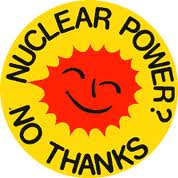A cash-strapped German state will fork out billions of taxpayers’ euros to deal with nuclear waste produced by an industry two out of three Germans want axed. And it won’t even be for permanent disposal, because worldwide there’s no safe technology for that. For years, anti-nuclear activists have demanded to no avail that the nuclear power industry fund the waste handling problem.
One group, the Bürgerinitiative Umweltschutz Lüchow-Dannenberg, which has fought waste dumping at the northern village of Gorleben for 34 years, speaks for many when it demands: “Given the exploding costs of the nuclear waste disaster, the piggy bank of the power companies with the tax-free ‘reserves’ has to be slaughtered at last.” The group points out that the companies have squirreled away 27.5 billion euros for dismantling nuclear installations and disposal of waste.
Demolition of a shut down recycling plant at Karlsruhe is likely to cost 250 million euros more than originally planned, reported the regional "Mainpost" newspaper on 17 February. Before that revelation the cost had been stated at 2.63 billion euros; 2.2 billion of that for fusing the waste in glass and demolishing the buildings. The newest revision put the total at 2.88 billion euros.
That emerges from the answer by the federal environment ministry to a parliamentary question by The Greens. The reason it gives is that the Schacht Konrad repository in the city of Salzgitter 370 kilometres to the north is to start operating later than planned; the former iron ore mine is to take in building rubble with weak and medium radioactivity. Instead of 2014 as planned, the rubble would probably not start to move from Karlsruhe before 2019. Interim storage in Karlsruhe will cost taxpayers additional millions.
Although the power industry produced 70% of the waste in the recycling facility, the government says the industry will have to pay only 32% of the costs.
More expensive will be the planned retrieval of waste from and remedial action on the flooding repository of Asse II in the Wolfenbüttel district of Lower Saxony, not so far from Salzgitter. The local “Braunschweiger Zeitung” newspaper reported that retrieval – that is taking the waste out of the former salt mine again – will cost more than two billion euros. Test drilling is to start in spring, but storage drums are thought to be damaged.
In a statement to the federal parliament’s environment committee, from which the paper quotes, the environment ministry writes: “It is to be assumed that the costs of operating the Pit Facility Asse II, the conditioning and interim storage of the retrieved nuclear wastes could reach more than two billion euros.” This did not include the costs of ultimate closure of the repository and the final storage of the wastes. Most of the waste has come from recycling in Karlsruhe after being produced by the shut down Obrigheim nuclear power plant in southern Germany.
Another dangerously failed repository, Morsleben, a north German former salt mine in danger of collapsing on itself, is seldom mentioned in current debate, notes the Gorleben group. Scientists of the Deutsches Brennstoffinstitut (German Fuel Institute) in Freiberg, Saxony, already noted in 1969, when this was still East German jurisdiction: "Despite small leaks at present, the pit is vulnerable to great hydrological endangerment.” During East German rule, 14,430 cubic metres of wastes were taken in. They were sprayed, tipped and some stacked.
Between 1994 and 1998, when it was under unified German jurisdiction, another 22,320 cubic metres was added, most of it from western facilities. Still in 1997, Angela Merkel, then environment minister, now chancellor, wrote a blank cheque for Morsleben, saying in bureaucratese that the “final repository” would be safe “for the next decades”. The costs of closure are estimated by the Federal Office for Radiation Protection, the responsible authority, at about 2.57 billion euros. Taxpayer pays.
And these are just a few examples...Believe no one claiming nuclear power is cheap. The industry and governments never include these costs when they claim it is.
Meanwhile public funding is tight for realistic police pay, all levels of education, health care, theatres (some are closing), unemployment and other welfare. Nature protection is feeling the pinch everywhere. Farming is subsidised to an obscene level, while species diversity shrinks. Non-government environment advocacy groups are being dried out.

